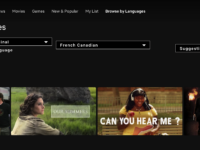My Globe and Mail op-ed opens by noting that after years of dismissing the warnings of likely retaliation, the Canadian government caved to U.S. pressure earlier this week as it cancelled the digital services tax. Faced with the U.S. suspension of trade negotiations, Finance Minister François-Philippe Champagne announced that the government would rescind the legislation that created it.
Columns
Quebec’s Streaming Regulation Bill 109: Unconstitutional, Unnecessary, and Unworkable
The federal government’s plans to regulate internet streaming services such as Netflix and Spotify through the Online Streaming Act have been mired in regulatory battles and court cases for many months. My Globe and Mail op-ed notes that the government’s plans finally took a small step forward last month, as Canada’s broadcast regulator, the Canadian Radio-television and Telecommunications Commission, completed weeks of hearings into what counts as Canadian content, or “Cancon.”
Yet in the midst of the latest hearings, the Quebec government threw a monkey wrench into the entire process. Not content to wait for the CRTC process to play out, the provincial government introduced its own streaming regulation bill that is likely to spark a constitutional challenge. Quebec’s Bill 109 contemplates government intervention into how content is presented to subscribers, and would introduce unprecedented quota requirements that could lead to blocked services in Quebec or the removal of thousands of non-French titles from content libraries.
When the Drumbeat of Intolerance Becomes Too Loud to Ignore: Reflections on Campus Antisemitism, Academic Freedom and My Global Technology Law Exchange Course
The need for fact-based, good-faith discussion and exchange to address our most challenging policy issues has never been greater. My Hub Canada op-ed notes that universities should be ideally suited for a leading role, yet in recent months, the drumbeat of intolerance has undermined their ability to do so. Last week, the well-documented rise of antisemitism and anti-Zionism on North American campuses hit home as I was conducting a global exchange that brought together students from five continents representing a remarkably diverse array of religious, political, and technical backgrounds.
Solomon’s Choice: Charting the Future of AI Policy in Canada
The decision to create a Minister for Artificial Intelligence sends an unmistakable signal that the Carney government recognizes the need to prioritize AI as a core part of its economic strategy. My Globe and Mail op-ed notes that while few doubt the importance of AI, what the federal government should do about it is far less certain. The Trudeau government emphasized both government handouts and regulation, with billions in AI spending promises on the one hand and ill-considered legislation that was out of step with global trends on the other. The result was a mish-mash of incoherent policies that left the AI sector confused, civil society frustrated and Canada at risk of being left behind.
Elevating AI to a full ministerial position suggests Prime Minister Mark Carney wants to fix the status quo, but in some ways the new office looks like an impossible job dressed up in ambition. Evan Solomon, the minister, steps into a role full of symbolism but operationally murky. Mr. Solomon may well find that cutting more cheques or introducing regulations won’t solve the issue.
Canadian Health Data Requires Stronger Safeguards With Lost Canada-U.S. Trust
With today’s implementation of tariffs on both sides of the Canada-U.S. border, the level of mistrust between our countries has grown, whether urgent calls to “Buy Canadian” or boos and catcalls at the playing of the American national anthem. Should we continue down this path, Mr. Trump will surely seek to exploit more of Canada’s potential vulnerabilities. Last week, I co-wrote an op-ed with Kumanan Wilson on one such vulnerability: our health data, whose protection has yet to attract much attention but which could emerge as an issue.











